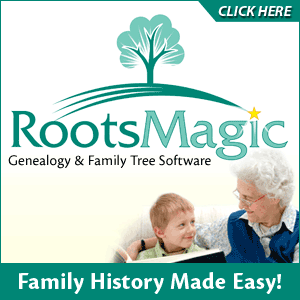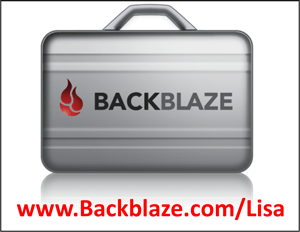History Hub Tutorial
Show Notes: Are you trying to work on a genealogy brick wall, and you think the records you need might be at the National Archives? In this video, I’m going to show you a new way that you can get answers and hopefully get the records quickly.
The National Archives is a great place to do that, but as I’ve mentioned before in this video, their website can be a bit daunting. However, I’ve got some good news. They have updated the website, and tucked away in that update is a special area where you can ask questions and get answers from many different sources including the staff at the National Archives.
It’s called History Hub. This updated platform is a place where the staff will actually answer your questions. You’ll also get responses from other archivists, librarians, museum curators, genealogists, and history enthusiasts. We all have areas of expertise and a wide array of experience, and the new History Hub makes it easier to help each other.
History Hub Show Notes
Downloadable ad-free Show Notes handout for Premium Members.
History Hub Free Account
Before you can ask a question or help answer a question, you’ll need to register for a free History Hub account. To do so, click the Create your History Hub account now link on the home page. Type in the account name you want, enter your email address and a password and click the box to agree to the terms of service.
If you are a returning History Hub user, you will need to reset your password and re-accept the community Terms of Use when you first log in.
Be aware that accounts that have not been used for over 1 year are automatically deactivated. So, you can email them at historyhub@nara.gov and they will reactivate your account.
Searching History Hub
Searching for answers at the History Hub is pretty simple and easy to do. You can enter your question in the “Ask” field on the History Hub homepage, or within a specific community. And we’ll talk about communities in just a second.
Let’s first ask a question. There’s a very good chance that someone else has already asked a very similar question to the one you have and there may already be a lot of contributions that will have the information you need.
Go to History.gov and type your question or some keywords into the Ask box. Don’t click the Ask button just yet. Give it a second to show you any potential answers that are already on History Hub. They will appear as a list below the Ask box.
Again, those answers will build up over time, so if when you ask your question you don’t see a similar answer, that’s OK. Go ahead and click the Ask button now and you’ll be taken to a page called Ask a Question in Researchers Help where you can write up your question. Include any relevant information you already know, such as names, dates, and places, and also mention specifically where you’ve already looked. That’s going to help them help you.
You can also add Tags to your question so that if someone searches for a tag, your request will also pop up. And be sure to check the box at the bottom so that you’ll be notified when someone replies to your post.
There are a couple of things to understand and keep in mind. First, all questions are public. So don’t post your phone number or other personal information about you or other living people.
Second, all questions are reviewed and moderated to make sure they comply with History Hub’s Terms and Conditions which again you can read when you sign up for your account. They only moderate and answer questions on weekdays during regular business hours, so patience is a virtue here.
In addition to the Ask a Question box, you’ll find a search bar at the top of the page. This search field searches the entire History Hub website. It’s very similar to the Ask a Question search bar in that once you enter your search terms, you’ll want to wait and let it populate possible answers that are already on the website. It will show you Forums, blogs and communities where your terms are being discussed.
You’ll also find a link to Advanced Search in the bottom right corner of that prepopulated list. This gives you a place to filter down in several creative ways which is very handy if you’re looking for information on a pretty broad topic or one that has had a lot of activity on History Hub.
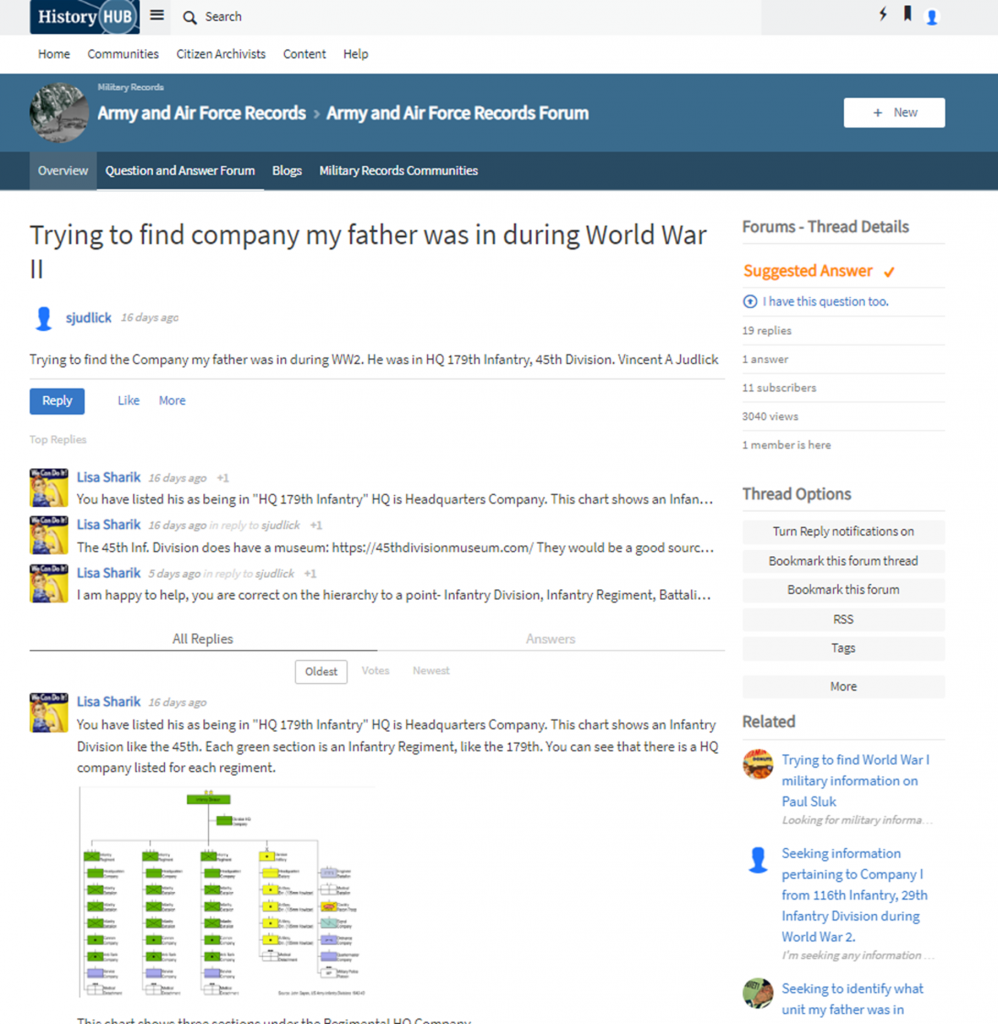
History Hub search example
They even give you an RSS feed for your specific query. So, if you use an RSS reader to follow blogs and podcasts, you could add this link to it to sort of bookmark this search and keep up to date on the activity on this topic. If you don’t use a Feed Reader currently, but that sounds interesting to you, check out a feed reader like https://feedburner.google.com/ or just google Feed Reader.
Browsing History Hub
Even if you don’t have a specific question, History Hub is worth browsing. There are a couple of ways to do that.
When looking at a community (for example, the Genealogy page), you’ll see:
- Ask a Question.
- Recent Blog Posts from this community.
- Top Questions where you can look through the most popular questions and topics. This also includes threads from related forums. Use the filters underneath the title of this section to focus even more.
- Activity Stream which features the most recent conversations.
- Explore Communities. History Hub currently hosts 19 communities, including “Researchers Help,” Military Records, Genealogy, and more. To see them all, click on Communities at the top of any page on the History Hub website.
At History Hub you can not only ask questions, you can also answer them. Since all of us have expertise in our own areas of genealogy, History Hub encourages everyone to share their knowledge and experience with other users who are new to archival and genealogical research. So, you can help out a fellow genealogist by clicking Reply at the bottom of their post and sharing what you know about the topic.
Notifications, Updates, and Subscriptions
As I mentioned before, this site is building up content over time. So, you’re probably going to want to follow topics, and History Hub offers a couple of ways to do that.
Forum Updates & Notifications
If you’re interested in following a particular topic, such as Census Records, or Army and Air Force Records, you can get updates by email and on the platform for all new questions and answers in that specific forum. To do that, click on any community’s Question and Answer Forum tab, then click the Turn Forum notifications on link in the sidebar of that Forum’s homepage.
Subscribe to Community Updates
You can also receive daily or weekly email updates within a specific community, including new blog posts and questions. To do that on any Community Overview page, click “Email digest options” in the right column sidebar.
Getting Help with History Hub
History Hub Help Files: Getting Started. Again, this website is newly revamped, so they are still working out the bugs. You can report any problems or ask questions in the Technical Help and Support Forum.
Resources
Downloadable ad-free Show Notes handout for Premium Members.
Genealogy Gems Podcast Episode 237
The Genealogy Gems Podcast is the leading genealogy and family history show. Launched in 2007, the show is hosted by genealogy author, keynote presenter, and video producer Lisa Louise Cooke. The podcast can be found in all major podcasting directories, or download the exclusive Genealogy Gems Podcast app to listen to all the episodes and receive bonus content.
Podcast host: Lisa Louise Cooke
January 2020
Download the episode mp3
Download the Show Notes PDF in the Genealogy Gems Podcast app.
We are celebrating the 10th anniversary of the Genealogy Gems app. We blazed a new trail back in 2010 when we launched the app – apps were still really new back then. I loved the idea of having a way to deliver exclusive bonus content to you as well as the audio, the show notes and best of all an easy way for you to contact me and the show.
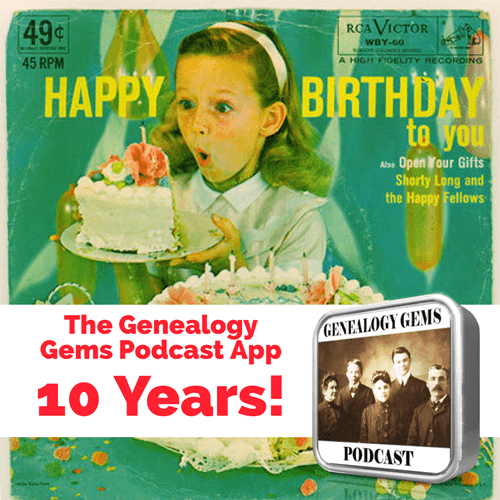
It’s more popular than ever, and as far as I know we are still the only genealogy podcast app available. If you haven’t already downloaded it just search for Genealogy Gems in Google Play or Apple’s App Store, or get the right app for your phone or tablet here.
In this episode I have two interviews for you on very different subjects. First up will be a follow up to last month’s episode where we focused specifically on the New York Public Library Photographers’ Identities Catalog.
Well, in this episode we’re going to talk to the genealogy reference librarian at the New York Public Library, Andy McCarthy. And as you’ll hear, there are a massive amount of resource available there for genealogists everywhere.
Then we’ll switch gears to Scandinavian genealogy with David Fryxell, author of the new book The Family Tree Scandinavian Genealogy Guide: How to Trace Your Ancestors in Denmark, Sweden and Norway.
The free podcast is sponsored by RootsMagic
GEM: The New York Public Library’s Milstein Division of United States
History, Local History & Genealogy with Reference Librarian Andy McCarthy.
The NYPL is one of the largest public genealogical collections in the country. They have a “wide-angle” approach to providing reference materials for local and US History.
The Top Resources at The New York Public Library
#1 The reference librarians.
Email them at history@nypl.org Ask questions, prepare for your visit.
#2 The online catalog:
Click here to visit the New York Public Library’s Online Catalog.
While they subscribe to many genealogy databases, they don’t host many. Use the catalog to determine what’s available, and what to ask for. See if what you’re looking for exists. Pay close attention to subject headings to identify resources.
#3 The Digital Collections
Click here to visit the Digital Collections at the New York Public Library.
- City Directory Collection up to 1933.
- Manhattan is the largest and is coming soon. This collection was only available previously on microfilm. It is a browse-only collection (not keyword searchable)
- The 1940 Phone Directory is online.
- Sanborn Fire Insurance Map collection is digitized and online.
- The Map Wharper which is a crowd-sourcing project providing for historic map overlays, and super zooming in views.
Offline Materials:
They also have a massive collection available in house of books, pamphlets, newspapers, etc. There are research and photo copying services available.
#4 Research Guides online
Click here to view the New York Public Library’s research guides.
Before you go:
- Definitely reach out before you go.
- Provide them with specific questions and they can help you identify what to focus on while you’re there.
- Visit the Milstein home page. They also have many public classes. Check to see what will be available during your visit.
One of Andy’s Favorites Collections
The Photographic Views of NYC Collection. Arranged by cross streets
The free podcast is sponsored by MyHeritage

GEM: Scandinavian Research with Author David Fryxell
David A. Fryxell is the author of the book The Family Tree Scandinavian Genealogy Guide: How to Trace Your Ancestors in Denmark, Sweden and Norway.
David is an award-winning author, editor, speaker and publishing consultant. He founded Family Tree Magazine, the nation’s leading genealogy publication. As a writing expert, he wrote the Nonfiction column for Writer’s Digest magazine for more than a decade and served as director of the famous Maui Writer’s Retreat. He has authored countless articles for Family Tree Magazine, and is also the author of additional books including Good Old Days, My Ass and MicroHistory: Ideas and inventions that made the modern world.

Author David Fryxell
Here’s a brief outline of my Q&A with David Fryxell on his new book and Scandinavian genealogy research:
Question:
To understand the ties between the Scandinavian countries, and why countries like Finland and Iceland aren’t included, we have to learn about the cultures and languages, right?
Answer:
Scandinavian countries are really tied by language. And at one point all the countries were united. Borders change. The records reflect these various changes.
Question:
What’s the timeline of Scandinavian immigration?
Answer:
The First Wave, 1825–1860
The Second Wave, 1865–1880
The Third Wave, 1880–1924
Question:
What value do you think DNA testing provides, and what should we keep in mind if we do test?
Answer:
DNA results are most helpful to find other relatives who may be able to assist in your research.
Question:
Let’s say we know we’ve identified the ancestor who immigrated. What else do we need to know before we can jump the pond and start digging into Scandinavian records?
Answer:
In the case of Scandinavian ancestors, you may not have to find the U.S. passenger records. They have excellent passenger departure records.
Question:
Tell us about the census in Scandinavia. Is it consistent among all three countries?
Answer:
Norway and Denmark have good census records. You can find them at:
- FamilySearch.org
- MyHeritage
- and Digital Archive Norway
They are increasingly searchable, and much like our census records in the U.S.
Sweden doesn’t really have useful census records. But they have Household Inventory records in church books. They were recorded every year. Turn to websites such as ArchivDigital, and Ancestry.com.
Question:
Let’s dig into the records. Where do you recommend we start?
Answer:
Church records are key. (Vital Records, census, vaccination, etc.) Also Military, Land and Tax.
Question:
I love that chapter 16 is called What to do when you get stuck! Give us an example of a common area where researchers get stuck and one of your favorite strategies for unsticking them.
Answer:
- Get familiar with and pay close attention to patronymic naming conventions where a man’s name is typically based on the given name of their father.
- Look closely!
- Challenge your assumptions!
More Resources from David Fryxell: https://vikinggenealogy.com
Protect Your Precious Genealogy Data
Don’t wait another day. Get the computer backup that I use www.backblaze.com/Lisa.
Profile America: First Radio Broadcast
Monday, January 13th. Today is the anniversary of the first radio broadcast to the public. It took place 110 years ago in New York City, engineered by Lee deForest, a radio pioneer and inventor of the electron tube.
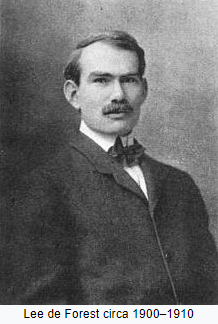
The 1910 broadcast wasn’t made from a purpose-built radio studio, but from the Metropolitan Opera house. DeForest broadcast the voices of Enrico Caruso and other opera singers. A small but impressed audience throughout the city gathered around special receivers to listen with headphones.
Today, 95 percent of American households have at least one radio.
One-hundred ten years after deForest’s lonely effort, some 5,400 radio stations employ about 92,000 people.
Sources:
- First broadcast, accessed 9/10/2019
- Receivers, accessed 9/10/2019
- Households with radios, accessed 9/10/2019
- Radio broadcasting establishments, County Business Patterns, NAICS 51511
Courtesy of Census.gov.
MyHeritage LIVE conference
I’ll be speaking at this conference in Tel Aviv, Israel on October 25 & 26, 2020. Read more here.
RootsTech 2020
I’ll be presenting 4 sessions and look forward to visiting with you at the Genealogy Gems booth at the front of the exhibit hall. Get all the details here.
Read our latest articles at Genealogy Gems:
- 5 Steps to Digitizing Your Old Negatives
- How to Find and Browse Unindexed Records at Ancestry – The Better Browsing Checklist
- Best Strategies: How to Find Church Marriage Records
Become a Genealogy Gems Premium eLearning Member
Gain access to the complete Premium podcast archive of over 150 episodes and more than 50 video webinars. Become a member here.
Please Help Us by Taking the 1 Minute Genealogy Gems Survey
Please help us create the best podcast for you by taking this very short survey.
Follow Lisa and Genealogy Gems on Social Media:
- Instagram: Follow me here.
- Facebook: “Like” the Genealogy Gems Podcast page here.
- Pinterest: Follow me here.
- Genealogy Gems YouTube Channel – Subscribe here.
Stay Up to Date with the Genealogy Gems Newsletter
The Genealogy Gems email newsletter is the best way to stay informed about what’s available with your Premium eLearning Membership. Click here to sign up today.

